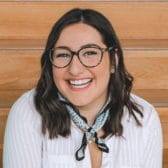
‘Jews are more Orthodox’ ‘Jews are more secular,’ ‘Young Jews are detached from Judaism,’ ‘There are more Jews than ever and they are staying Jewish,’ ‘The Jewish community is more diverse but more divided than ever.’
Already drastic headlines are sweeping the internet. That’s because the Pew Research Center’s new survey of Jewish Americans was released today.
Here are the highlights from the survey, plus thoughts from experts on a panel about what the key findings could mean for the Jewish American world.
Jews grew in numbers, but we remain about the same percentage of the population
There are approximately 7.5 Million American Jews today. 5.8 million are adults and 1.8 million are children. In 2013, when Pew conducted their first survey of Jewish Americans, the estimate was 6.7 million.
Yet, although we grew in numbers, Pew estimates around 2.4% of U.S. adults are Jewish, which is similar to the 2.2% they found in 2013.
“I think it’s important to note this is not a story of doom and gloom,” said Rabbi Marc Baker, President of the Combined Jewish Philanthropies of Greater Boston, about these numbers in the panel discussion. “We might have thought that inertia alone would suggest that we’d be shrinking, we’re getting weaker, but those elements of stability point out the fact that so much has actually stayed the same since 2013, I think should be celebrated as an enormous success.”
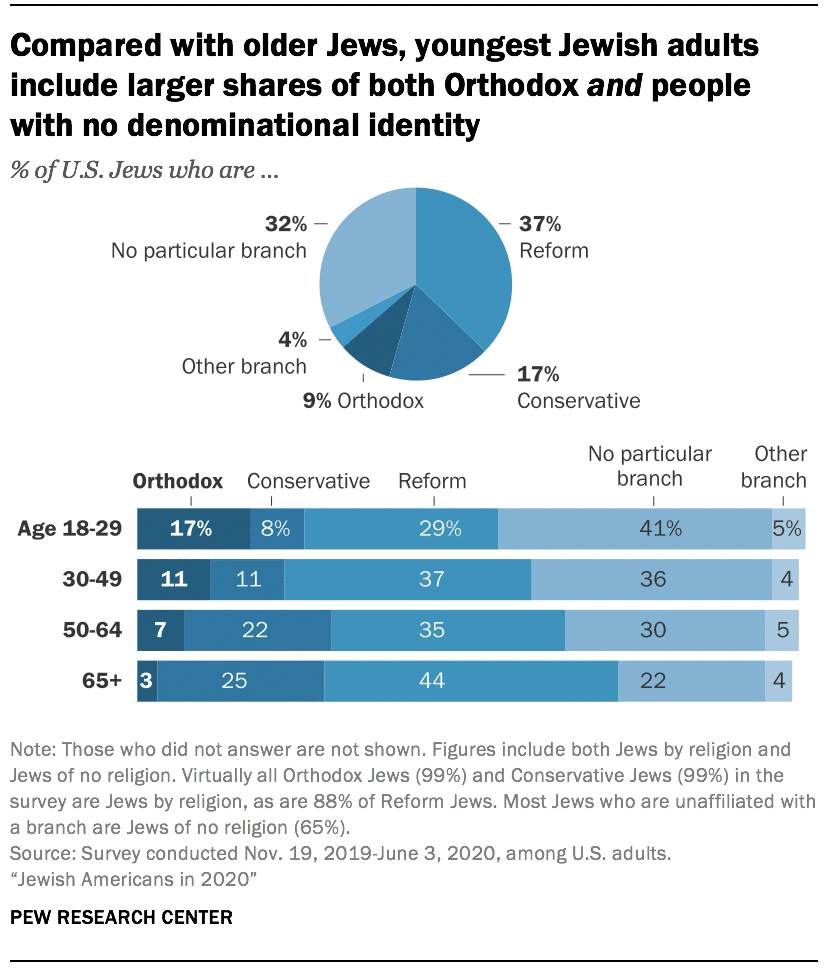
We’re not connecting to each other and growing increasingly polarized
Most young Jews are either unaffiliated or Orthodox. Though about 70% of Jews over 65 identified as either Conservative or Reform, just 37% of adults under 30 identified with these branches of Judaism — which tended to dominate the population in the past. In comparison, 17% of Jews under 30 identified as Orthodox.
Perhaps more notably, members of different denominations generally don’t feel like they have “a lot” in common with one another. About half of Orthodox Jews in the U.S. say they have “not much” or “nothing at all” in common with Reform Jews. Similarly, the majority of Reform Jews reciprocate those feelings- 39% say they have “not much” in common with Orthodox Jews and 21% say they have “nothing at all” in common.
“Today is a wake up call to regard our growing divisions as opportunities for uncovering what unites and divides us,” said Rabbi Elka Abrahamson, President of The Wexner Foundation, on this polarizaiton. She says there is an additional divide widening the gap.
“[It’s] between those who can afford the very best of what we offer, like Jewish preschools and day schools, summer camps, short memberships and homes within a walking distance to those tools, and those who can’t afford it,” said Abrahamson in the panel discussion.
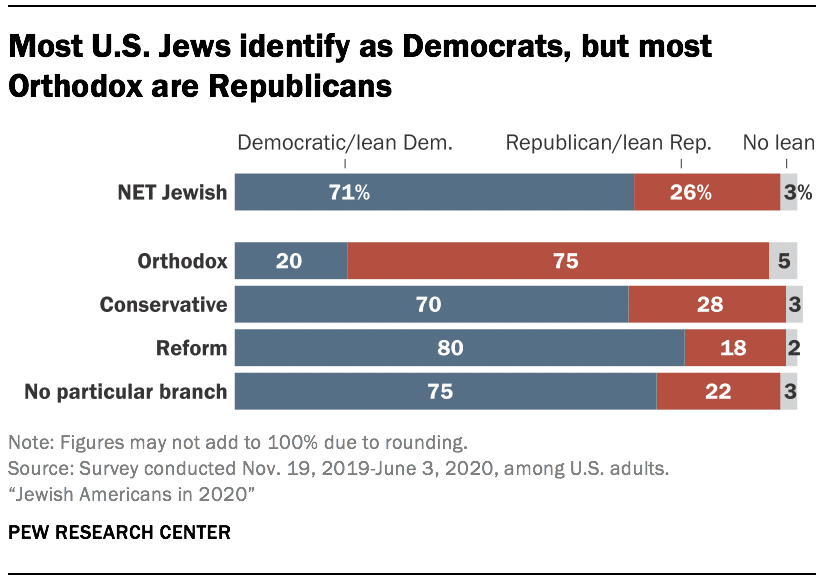
15% of young Jews are not White, 10% of Jews are immigrants
Most Jews identify as White, but American Jewish communities are becoming more racially and ethnically diverse. Among young Jews (ages 18 to 29), 15% identified as non-Hispanic White, 7% of American Jews identified with some combination of Sephardic or Mizrahi customs and 10% of the community are immigrants.
“Let’s see some of this data as the beginning of this work… to ask ourselves how can we lift up these diverse voices,” said Dr. Mijal Bitton, Scholar in Residence at the Shalom Hartman Institute of North America. “We have to be sensitive to different expressions of Jewishness. For example, I have family members who are White and Sephardic, Ashkenazi and Black Jews.”
“I urge us to remember that behind every single data point and percentage there are [real] people. They are individuals in our communities who want to feel seen, who want to feel included, and who want to feel like we matter.”
Views on Israel are Changing
Young Jews are generally less emotionally attached to Israel than older ones, the study has found. As of 2020, half of Jewish adults under age 30 describe themselves as very or somewhat emotionally attached to Israel, compared with two-thirds of Jews ages 65 and older.
Among Jewish adults under 30, 35% say that caring about Israel is essential, and about 25% say it’s not important to what being Jewish means to them.
One in 10 American Jews said they either “strongly support” or “somewhat support” the BDS movement. Some 43% of Jews oppose BDS, and another 43% haven’t heard much about it. When it comes to adults under 30, the survey found that almost half had heard little or nothing about the boycott movement.
Overall, eight-in-ten U.S. Jews say caring about Israel is an essential or important part of what being Jewish means to them.
Antisemitism and Holocaust denial has made Jews feel unsafe in America
Most Jewish people experienced some form of antisemitism in the past year, Pew reported.
75% of American Jews say there is more anti-Semitism in the United States than there was five years ago and over half of the people surveyed said that, as a Jewish person in the United States, they personally feel less safe today than they did five years ago.
Jews who wear distinctively religious clothing, like a kippah or head covering, are particularly likely to say they feel unsafe.
Almost three-quarters of U.S. Jews say they have heard or read about someone claiming in the past year that “the Holocaust did not happen or its severity has been exaggerated.”
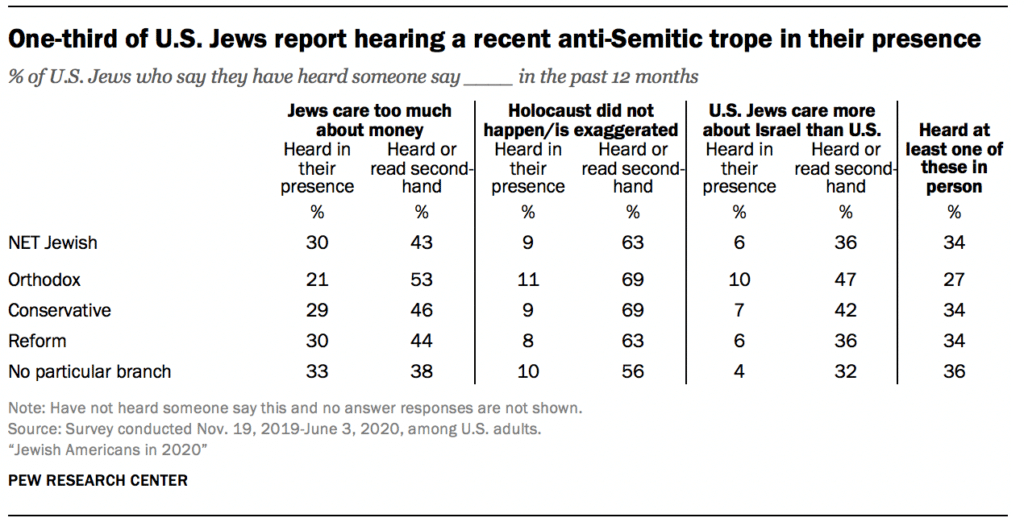
Nevertheless, Jewish pride has been unwavering
Despite a stark rise in antisemitism, its impact on the behavior of Jewish Americans seems to be minor.
Even among Jews who said they feel less safe, just one-in-ten (5% of all U.S. Jews) report that they have stayed away from a Jewish event or observance as a result.
More than 80% of U.S. Jews say that they feel at least some sense of belonging to the Jewish people, and three-quarters say that being Jewish is either very or somewhat important to them.
Holocaust remembrance is at the core of most Jews’ identity
More than 75% of U.S. Jews say that remembering the Holocaust is essential to their Jewish identity. Over half also say that working for justice and equality in society, being intellectually curious and continuing family traditions are essential.
Yet, only 15% consider observing Jewish law (Halacha) to be an essential element of what being Jewish means to them, personally. Naturally, this fact was uniquely different amongst those who identified as Orthodox Jews, 83% of whom deem Halacha essential.
Jewish Americans are less likely to believe in a traditional “Biblical” God or attend synagogue
A majority of all U.S. adults say they believe in God “as described in the Bible.” Among Jews, only about 25% agreed with that statement. Instead, Jewish Americans are more inclined to believe in some other kind of higher power – or no higher power at all, the Pew study found.
This could be connected to a decline in attendance of religious services. Only about 12% of Jewish Americans say they attend religious services weekly or more often.
Of 11 possible reasons for not attending religious services, the top choice is “I’m not religious.” Two-thirds of infrequent attenders say this is a reason they do not go to services more often. Other common explanations are “I’m just not interested” and “I express my Jewishness in other ways,” according to the survey.
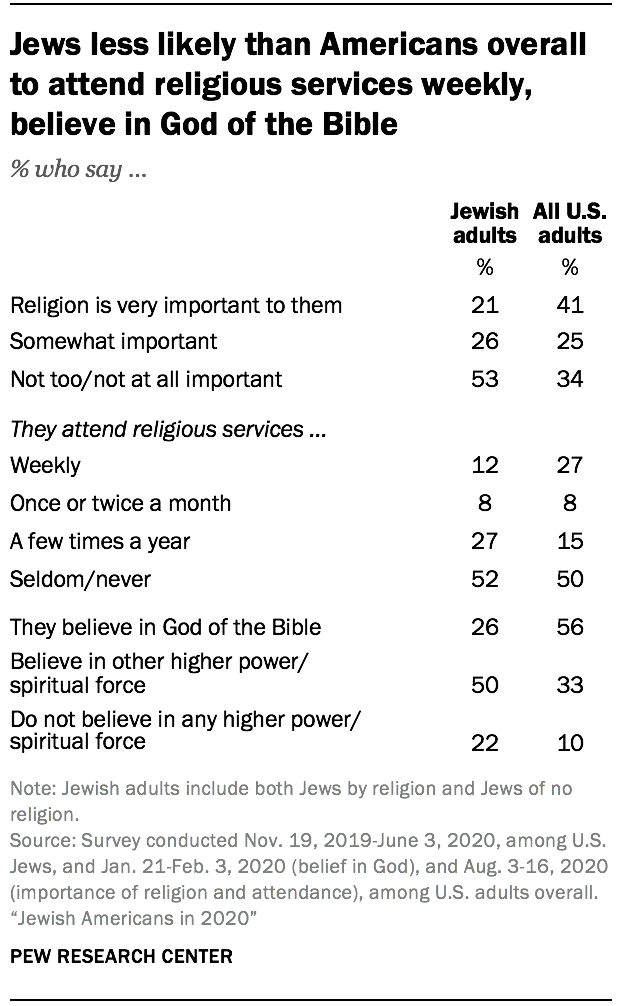
Yet, the survey found that of the Jews who answered that they “express [their] Jewishness in other ways,” most do engage in cultural activities, at least on occasion.
Over 75% enjoy Jewish foods, share Jewish culture or holidays with non-Jewish friends, visit historic Jewish sites when traveling and read Jewish literature.
What does this mean for modern day synagogues and Jewish communal life? These statistics fall in line with trends that community leaders like Baker and Bitton have already noticed and been working on.
“We are going to have different models of what a flourishing synagogue, or community center looks like,” said Bitton.
“There are synagogues that are struggling with membership and there are other synagogues that are reimagining themselves truly like a Beit Knesset, which doesn’t mean house of prayer, it means house of gathering,” added Baker. “I think that’s the direction that synagogues that are going to thrive.”
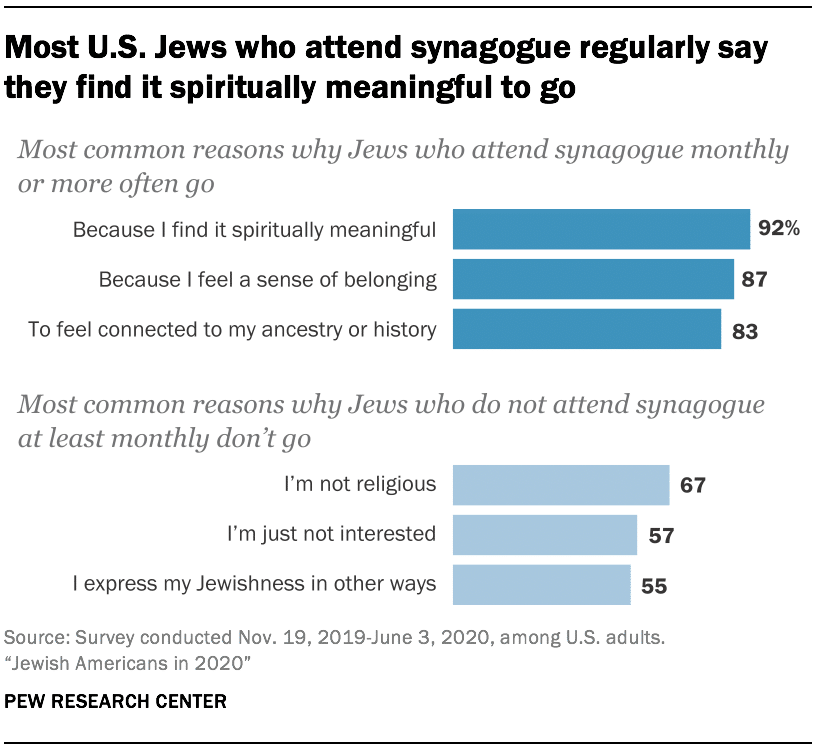
Preventing intermarriage is not a high priority
More Jews say it is more important for future grandchildren to share their political convictions or to carry on their family name than to marry someone who is Jewish.
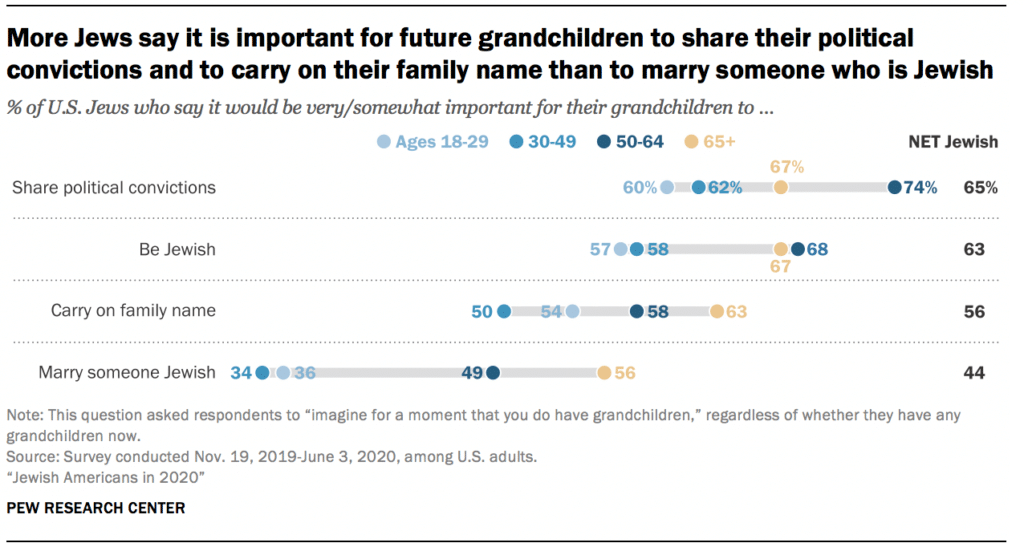
This 2021 survey found that in total, 42% of married Jews have a spouse who is not Jewish — similar to percentages of intermarriages to the 2013 survey.
What is notable is the emphasis and embracing of intermarriages. Across the survey’s respondents, preventing intermarriage is not a high priority.
Nearly two-thirds of U.S. Jews say rabbis should perform marriage ceremonies for interfaith couples and an additional 25% say “it depends.” Only 9% flatly object.
The survey also found that the majority of intermarried couples are raising their children Jewish.
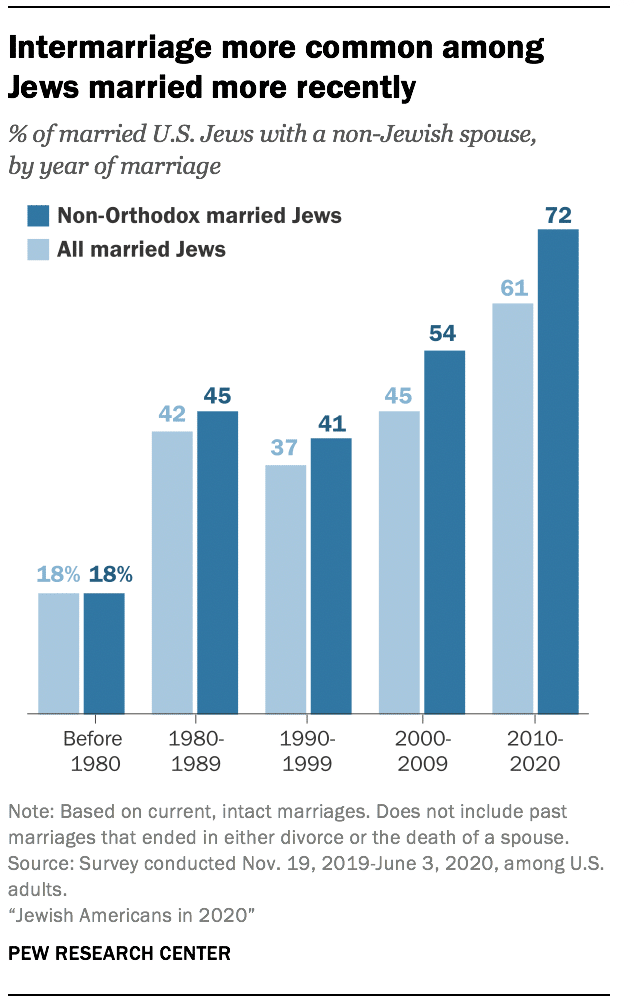
Note: This is the second survey of Jewish Americans Pew has conducted, the last being in 2013. The survey was well-covered by Jewish media in 2013 and became an influential document in the Jewish world. Not to mention, it was used to help determine how Jewish communities allocated funds. This year, Pew hosted a panel discussion alongisde the Jewish Federations of North America and The Neubauer Family Foundation discussing the findings and their implications.
The 2021 survey has a notable margin of error at 3% overall and over 8% in some subsects, like the Orthodox community and ages 18-29. Pew surveyed 4,718 Jewish American adults. The cited research was collected from November 2019 to June 2020, with a brief additional note about COVID-19.
Originally Published May 12, 2021 12:33AM EDT
